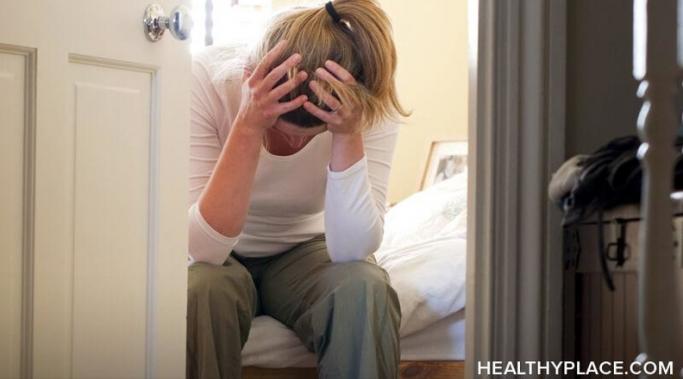There are times when your eating disorder and/or other co-morbid illnesses require inpatient psychiatric treatment. In an earlier post, I discussed my decision to enter an inpatient psychiatric hospital for anorexia, alcohol abuse treatment. In this video, I talk more about why I need inpatient eating disorders treatment.
Anorexia Treatment
In February 2010, I entered inpatient treatment for anorexia nervosa, anxiety, and depression. I felt like a complete failure that this was my sixth inpatient admission, and I vowed that it would be my last admission.
On Monday, I will once again admit myself to the hospital for six days of psychiatric treatment. It was a difficult decision to make, and one that many of us struggling with eating disorders and co-morbid illnesses often face.
The first step in recovering from any eating disorder is accepting that you do have an illness that deserves and needs treatment.
The next step is finding the appropriate people to guide you in recovering from your eating disorder. That can be very difficult. However, there are different types of help out there and I would encourage you to never give up trying to find what works for you.
Surviving ED really is the fulfillment of a dream: to reach out to other people who have eating disorders, and to offer them both honesty and hope and perhaps help them feel just a little bit less alone in their own journeys of recovery.
Surviving ED is one-year old this week. The road of recovery has been long and winding, with many twists and turns, lapses and relapses, and picking myself up to try just one more time. The journey of recovery sometimes feels endless and tiring, and I know that it is hard to not want to give up.
However, at the end is freedom from anorexia and ultimately, a full and healthy life.
For weeks, I have struggled to do anything beyond the bare minimum. Eating disorders are in part coping mechanisms, and can be deceptively helpful in masking painful emotions. That can make recovery from an eating disorder very difficult, because most people struggle with painful emotions and would rather push these feelings aside than face them.
I always like to think I am different - but I am not - and that I can push through the emotions the recovery stirs up. Each time I begin the recovery process with a fierce determination to beat anorexia nervosa for the last time. I feel strong and sure as I start to eat regular meals and snacks and stop all related eating disorder behaviors, and I know in my heart that I will travel the road to full recovery without roadblocks or detours.
But emotions can only be suppressed for so long, and I inevitably become anxious and depressed as I begin to eat like a normal person. Determination fades and strength wavers as all the emotions that I couldn't feel while in the middle of my eating disorder come roaring back, leaving me cowering in the corner.
I recently learned that several friends of mine also are struggling with their eating disorders, and that it hurts even though I also have an eating disorder.
You cannot always tell a person has an eating disorder simply by looking at him or her.
I stressed that because one of the most common and enduring myths about eating disorders is that the person must be young, female, and extremely emaciated to have an eating disorder.
That is simply not true.
"We must be willing to get rid of the life we've planned, so as to have the life that is waiting for us." ~ Joseph Campbell
I have struggled with anxiety and depression for weeks. Several mornings I stay in bed, huddled under my covers where it feels safe, until the very last possible moment. I think about the life I had before I developed anorexia. My husband and I were still together, sharing life and love, enjoying each other's company and spending time with family and friends.
Many days I don't want to get out to bed.
I am dealing with some difficult life issues right now, and of course the first thing I turn to is restricting my food intake in order to numb the pain and anxiety I am feeling.
There are some days that I feel as if this will go on forever. I contemplate my future and I can't see the light at the end of the eating disorder tunnel.
My thinness is an outward manifestation of my inner pain that I am unable to voice.
This is my last year of graduate school and I have started working on my thesis. It will be a creative non-fiction piece divided into two parts. One part will be about my struggles with anorexia nervosa, and my ultimate decision to begin the work of recovery in the midst of personal chaos. The other piece will review the memoirs and creative non-fiction writings written by women who have experienced anorexia and/or bulimia.
I deliberately chose to write my thesis about women only, in part because I plan to apply feminist theory to my thesis and I believe that eating disorders develop differently in women and men.
I have been enmeshed in writings about eating disorders these past few weeks, and I have found a common thread throughout the writings that resonate with my own experiences with anorexia.
Silence. At some point, each of these women have written about feeling silenced and having to regain their voices during recovery.
I believe at heart that eating disorders are illnesses of silence, of an inability to speak about inner pain, to give voice to what we are feeling and going through in the deepest reaches of our souls.







